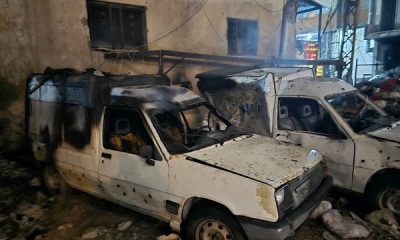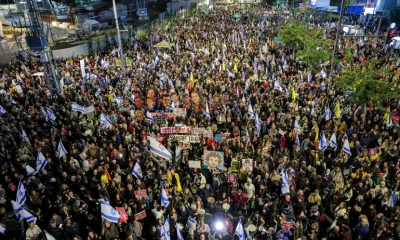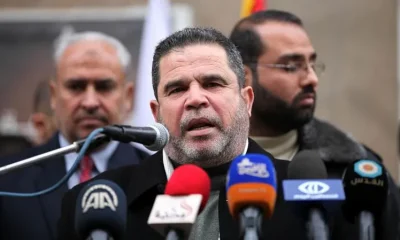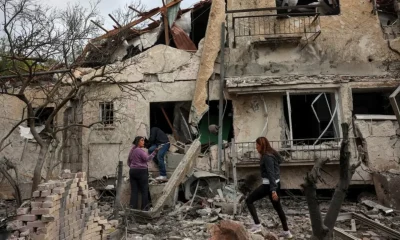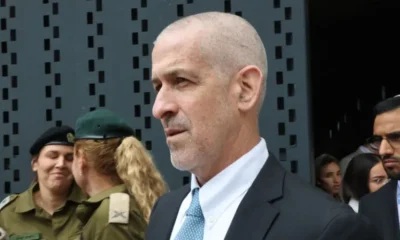International
Israel Strikes Spark Lebanon’s Deadliest Day in 20 Years
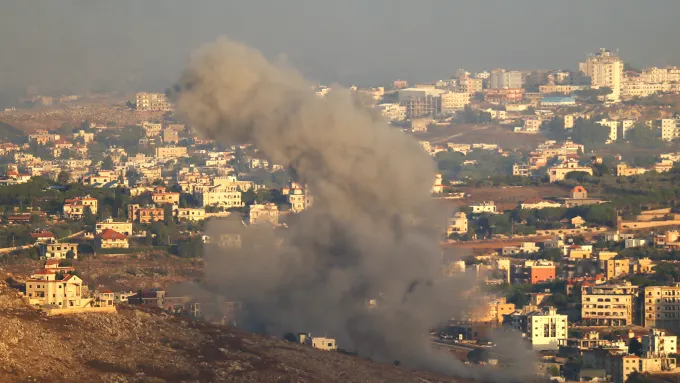
Israel has unleashed a massive wave of airstrikes across Lebanon on Monday, marking the country’s deadliest day since the 2006 conflict with Hezbollah, a powerful militant group backed by Iran.
The strikes killed at least 492 people, including numerous children, and left over 1,600 wounded, according to local authorities.
Desperate to escape the devastation, many residents fled their homes, seeking refuge from the escalating violence.
Israeli Prime Minister Benjamin Netanyahu declared that his country was shifting the “balance of power” on its northern front, with the military confirming it had targeted 1,600 Hezbollah assets across Lebanon on Monday.
A ground invasion remains a possibility, according to Israeli officials. The widespread and intense nature of the strikes has drawn warnings from multiple countries about the heightened risk of a broader regional conflict, urging urgent international intervention to de-escalate the situation.
Despite the ongoing clashes, neither Israel nor Hezbollah has officially labeled the current escalation as war.
Monday’s air campaign marked a significant intensification of Israel’s military efforts against Hezbollah, focusing on targets across southern and eastern Lebanon, areas known for the group’s stronghold.
Lebanon’s health ministry reported that women, children, and medics were among the casualties, although the exact breakdown between civilians and Hezbollah militants remains unclear.
Many of the areas hit were residential neighborhoods and villages, raising concerns about the impact on civilians.
Israeli military spokesperson Daniel Hagari stated that the strikes targeted Hezbollah’s military capabilities, including “cruise missiles” with ranges extending hundreds of kilometers, rockets, and explosive warheads, reportedly stored in civilian homes.

The attacks prompted widespread panic, with residents receiving evacuation warnings via text messages and phone calls from unknown numbers.
An Israeli warning also interrupted the broadcast of a popular Lebanese radio station, further fueling the sense of urgency.
Residents had little time to flee before the bombing commenced. In Tyre, a southern coastal city, a resident described hearing Israeli warplanes “raining” bombs near his home early Monday morning.
Schools and universities across the country canceled classes, and some flights to and from Beirut were suspended, as schools were repurposed as shelters for those seeking safety.
In response to Monday’s airstrikes, Hezbollah retaliated on Tuesday by launching multiple rocket barrages into northern Israel, targeting the Ramat David airbase, Meggido airfield, and the Amos base near Afula. Later in the day, the group fired additional rockets at the northern city of Kiryat Shmona.
While the Israeli military intercepted most of the 50 projectiles, some caused damage to buildings, with Israeli police reporting fires but no injuries.
Amid the escalating violence, the Israeli cabinet declared a “special situation” across the country, granting the government the authority to impose restrictions on civilian life, including limits on public gatherings.
Netanyahu emphasized that Israel’s objective was to disrupt Hezbollah’s involvement in the ongoing conflict with Hamas in Gaza.
The airstrikes have caused widespread destruction in residential areas, as shown in videos depicting demolished buildings and extensive casualties.
Monday’s death toll alone accounted for nearly half of the total Lebanese casualties during the entire 34-day war between Israel and Hezbollah in 2006.
EDITORS PICK:
- False Claims Tie Kamala Harris to Communism in Latino Exile Circles
- Russian Missile Test Ends in Failure, Experts Confirm
- Scholz Wins Breather Amid Party Pressure
Israeli warplanes were also spotted over regions like Mount Lebanon, where Hezbollah has little presence.
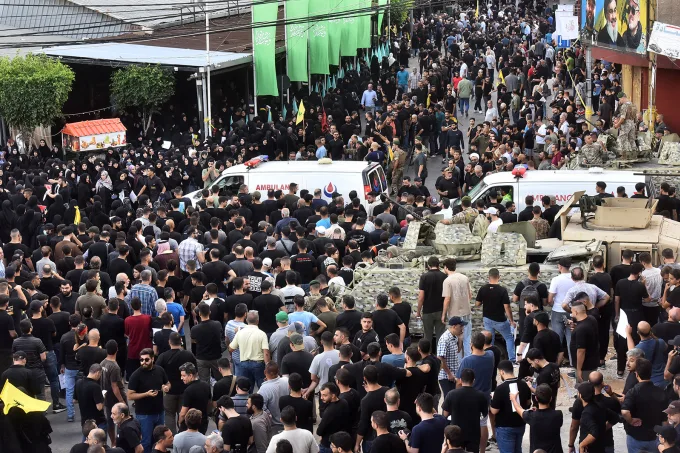
The situation has sparked a mass exodus, with more than 100,000 people displaced, according to a Lebanese NGO. Residents recounted scenes of buildings collapsing and towns emptying, with roads jammed as people attempted to flee.
Footage from Beirut’s southern suburbs showed debris and shattered glass strewn across the streets.
“We have nowhere to go, we have nothing,” said Mohamed Hamayda, a Syrian man displaced from Deir al-Zahrani, to Agence France-Presse.
Lebanon’s Health Minister Dr. Firass Abiad reported that convoys evacuating people had been “targeted,” including two ambulances, a fire truck, and a medical center. Two first responders were killed in the attacks.
The Israeli military claimed it was making efforts to “mitigate the harm to Lebanese civilians as much as possible,” while Netanyahu accused Hezbollah of using civilians as human shields while targeting Israeli citizens.
The conflict between Hezbollah and Israel has been ongoing for decades, but tensions have escalated significantly since October, following Hamas’ deadly attack on Israel.
Hezbollah, part of a Tehran-led alliance that includes groups in Yemen, Syria, Gaza, and Iraq, has been attacking Israeli targets in response to the Gaza conflict. The rising violence has once again brought the region to the brink of a full-scale war.
Last week, Hezbollah suffered a significant blow when Israel launched a twin attack that caused the simultaneous explosion of pagers and walkie-talkies used by the group’s members.
This was followed by an airstrike on a building in southern Beirut, killing at least 45 people, including a top commander, senior operatives, and civilians.
The following days witnessed some of the most intense exchanges of fire between Israel and Hezbollah in nearly a year, with Hezbollah launching projectiles deeper into Israeli territory than ever before and Israel retaliating with hundreds of strikes on southern Lebanon.
Netanyahu stated on Monday that Israel is altering the “security balance” in the north, aiming to sever Hezbollah’s ties with the war in Gaza.
Despite being militarily weakened and its communications networks compromised, Hezbollah’s second-in-command declared a “new chapter” in the confrontation, calling it “a battle without limits.”
Although the airstrikes and attacks suggest open conflict, both Israel and Hezbollah have refrained from officially declaring a state of war.
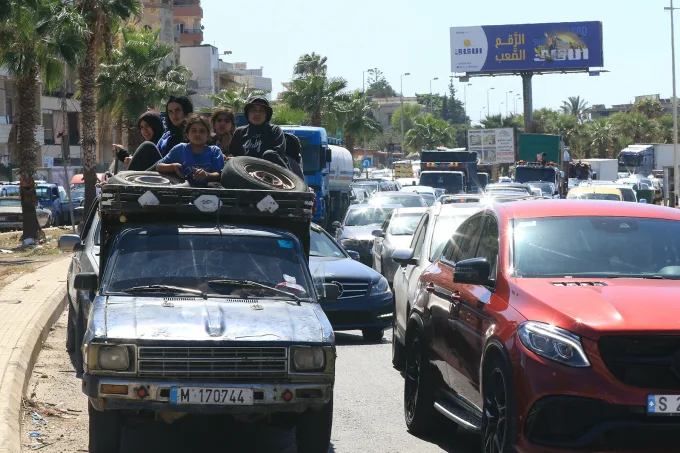
Israel’s military chief, Herzi Halevi, indicated that they are “preparing for the next phases,” while Netanyahu assured the Lebanese people that Israel is not at war with them, but with Hezbollah.
Iran has issued a stern warning to Israel about the “dangerous consequences” of its actions, with the Iranian president cautioning that the situation could plunge the region into a wider conflict.
Meanwhile, international efforts to de-escalate the crisis are intensifying. Qatar, a key mediator in the Israel-Hamas talks, warned that the region is on the “brink of the abyss,” and France has called for an emergency meeting of the UN Security Council to address the strikes.
Former US Defense Secretary Leon Panetta expressed concern, stating that the situation has “crossed a threshold” and warned that “we’re walking into a much wider war.”
As world leaders gather in New York for the UN General Assembly, diplomatic efforts are in full swing to persuade Israel not to escalate the conflict further with a ground invasion of Lebanon.
The United States, Israel’s closest ally, is working with its partners to find a diplomatic solution, with US officials expressing concern that Iran, a key backer of Hezbollah, could become directly involved in the conflict.
CLICK TO WATCH OUR VIDEO OF THE WEEK
Advertise or Publish a Story on EkoHot Blog:
Kindly contact us at ekohotblog@gmail.com. Breaking stories should be sent to the above email and substantiated with pictorial evidence.
Citizen journalists will receive a token as data incentive.
Call or Whatsapp: 0803 561 7233, 0703 414 5611


